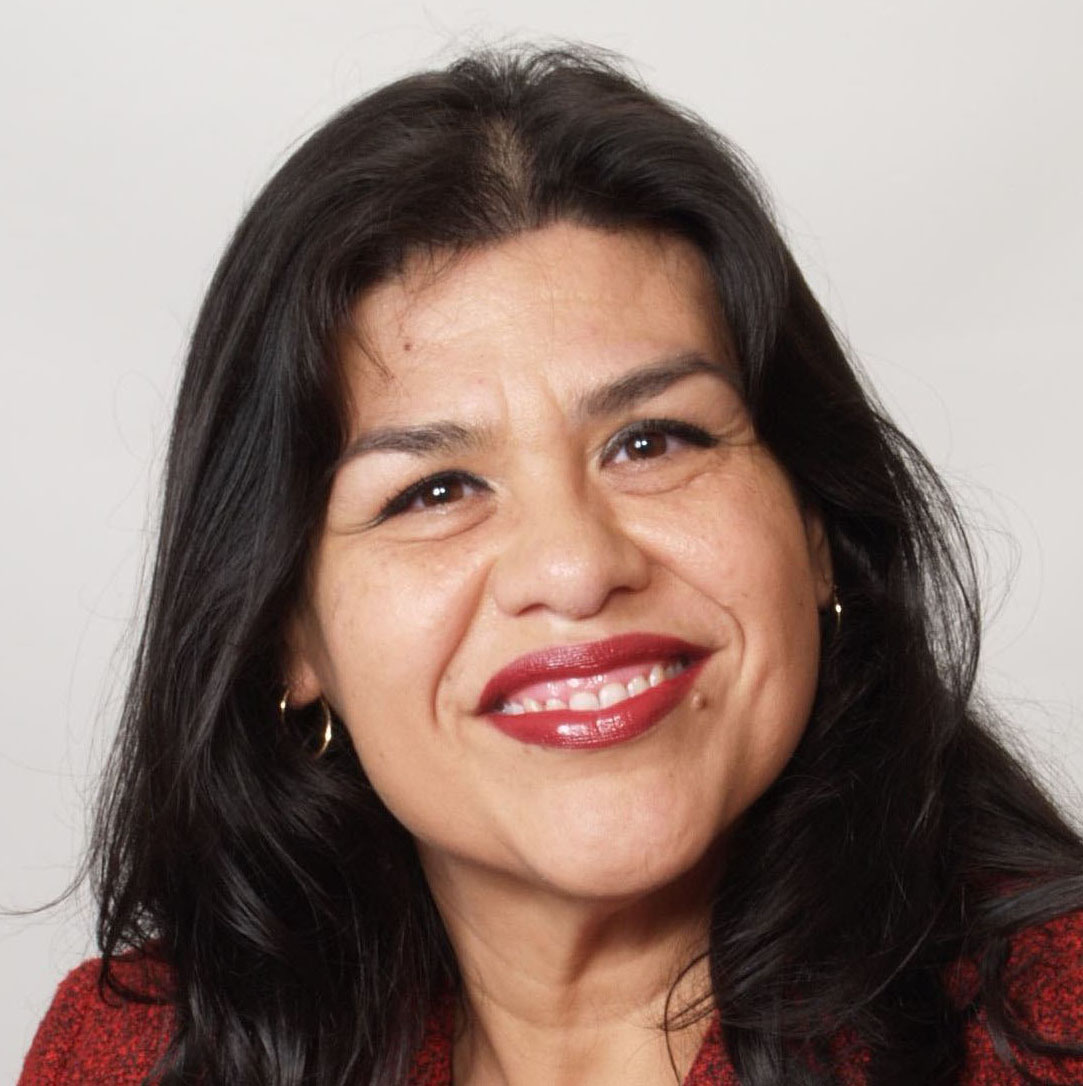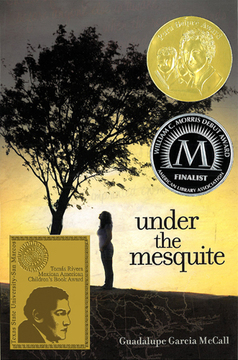INTERVIEWS:
Under the Mesquite
By Guadalupe Garcia McCall
Illustrations by

Under the Mesquite is the story of a teenage girl facing incredible challenges in her life, and how those experiences and the family alongside her shape her into the woman she is meant to become. Poet Guadalupe Garcia McCall discusses her first novel in verse.
As a story told in free verse poems, Under the Mesquite is crafted on multiple levels. How was the process of writing a novel in verse different from the process of writing individual poems?
Guadalupe Garcia McCall: Well, Under the Mesquite started out as a collection of individual poems that I had written over the years in my classroom, as examples for my students. However, after my editor, Emily Hazel, acquired it, the process of shaping it into a novel became much more challenging. I had to build an emotional arc. I had to think of creative ways of sequencing events in a story with poems. So in doing that, I looked at every poem as a small piece of cloth that fit into the quilt of the story. And just like with quilt making, some pieces of cloth were bright and cheerful while others were darker and deeper in color. Some pieces were soft and silky to the touch, but others were a little coarser and rougher on the skin. So in structuring that story quilt, I tried to balance them and put them together in a way in which they made sense but also told the story truthfully and honestly.
How much of Lupita’s story overlaps with your own experiences? Are there any specific anecdotes from your life that you incorporated into Under the Mesquite?
GGM: A lot of Lupita's story does overlap with my own experience. I think a lot of writers write what they know, and I'm no different. When I first structured Under the Mesquite, it was very much autobiographical. However, in building the characters, developing conflict, sequencing the events, and adding details, the true story of Lupita became more and more fictionalized. The main character's voyage is similar to but different from mine. Her own voice is stronger, wiser, and much more courageous than I ever was in dealing with difficulties. The setting certainly had a lot to do with the way the story developed. I wanted to keep that sense of Mexico as it used to be because, despite the recent media's focus on the turmoil along the border, a lot of my family still frequents Mexico, and I wanted to show that that connection is still there for members of our community. There were a lot of anecdotes from my own personal life that made it into this book. Most (although not all) of these poems are fictionalized accounts of actual events, which is to say I changed the sequence, the details, and the names, but I kept the essence of my life in them.
Are there ways in which you are different from Lupita? Among Lupita and her siblings, with whom do you identify most?
GGM: I would have to say while I am most like Lupita (because she was born from the poems that were about my life). I identify with Mami most because I am a mother. I feel that I love my children the way Mami loves her children, with that great sense of joy. I find comfort and love and happiness in cooking for them and watching over them (like Mami in "Making Tortillas" and when she’s looking out for them from a distance in "Swimming the Rio Grande").
Lupita uses acting and writing as ways to escape and express herself. Growing up, what activities or art forms did you gravitate toward?
GGM: Like Lupita, I was an actress in high school. I competed in acting and speaking events for our school, but I also loved to draw. I used to illustrate and frame all the costumes for our school plays just for fun. My drama teacher, Mr. Cruz, loved looking at them and often told me I should pursue a career in fashion. However, I've always been a writer first. Writing is my passion. It is something I have no control over. There are stories that come to me in the middle of the night, characters that rush in and take over my dreams, my thoughts, my everyday life. There's always a movie sequence developing in my head. I can't stop the reel, so I just write the action/dialogue on paper. It sounds weird, but I like it. It's a lot of fun listening to my imagination.
In Under the Mesquite, the difficulties of assimilating into the dominant US culture are prominent. What do you think the biggest challenges are for children adjusting to a new culture?
GGM: I think one of the biggest challenges for children when adjusting to a new culture is finding their own voice, their own sense of self, and hanging onto it within that new culture. It is easy to get lost in that new world, so children have to find the courage to say, “This is who I am, this is where I come from.” I think Lupita struggles with that because her friends have a valid point: culture is important. But so is growth. Finding the balance is hard, but very essential.
As a young immigrant from Mexico, how did you adjust to life in the US? Was there anything that was surprisingly easy or difficult for you?
GGM: The easy part of adjusting to life in the U.S. was the language. I was already reading and writing (in Spanish) when I came to the US, and, after an initial mistake in class placement, I was put in a bilingual classroom with a bilingual teacher. I think I learned English quickly because I'm a linguistic learner by nature. Communication is my strength. However, as I got older, I struggled with learning to speak English with an American accent instead of a Mexican accent. I can still remember my drama teacher, Mr. Cruz, shaking his head because I couldn't hear, much less pronounce, the difference between "chair" and "share". But he believed in me, so we muddled through it. As you will find in the book, it only took a million Blow Pops to get the job done.
Lupita’s mother, Mami, is a huge inspiration and role model to Lupita in the book. Growing up, did you have a role model or anyone you looked up to?
GGM: Oh, boy, did I ever. Not only did I have a loving, hardworking mother, I had many aunts who adored us. My Tia Genoveva comes to mind. She was very loving and nurturing and played a huge role in our lives. She lived with us when we were still in Mexico, and helped raise us. However, in the U.S., teachers were my greatest role models. My parents (and a lot of my friends' parents) honored and respected our teachers. They were wise and caring people. They mentored us, cultivated us, made a home for us in their classrooms. Growing up, I had many great teachers. I admired all of them.
What was your biggest challenge in writing this book?
GGM: My biggest challenge in writing this book was the subject matter. I didn't address my mother's illness in the original manuscript (the collection of poetry) because it is a difficult thing to talk about. It's a scary subject, cancer; one that my sisters and I address with respect and anxiety when we reminisce about our childhood. So writing a book in which all those anxieties and fears are brought to light was very challenging. But it made me see that time in my life for what it was: a time of loss and growth, part of the natural order of things, a part of life.
Do you have a favorite poem from the book? If so, why is it your favorite?
GGM: I love many of the poems in the book, but "Making Tortillas" is my favorite. It is pure memory, pure joy. It is not just a portrait of my mother. It is the essence of my family. It is who I am at my core.
You are both an author and an English teacher. Do you think the teacher in you has affected how you write books? If so, how? If not, is it challenging to keep the teacher and writer in you separate?
GGM: Being a teacher colors my writing in a way that I can't deny. As a teacher, I feel an enormous responsibility to my students. I see my students as my most important audience members, and so I have to produce work that I can share with them, work that enriches their lives, work that mirrors their world and helps them find themselves in life. It is most definitely challenging to keep the teacher separate from the writer, especially when I'm supposed to be teaching and the movie reel is going on in my head. What a bummer—not to be able to just drop everything and write!
What is one thing you would like your readers to take away from reading Under the Mesquite?
GGM: I would love for readers to find their own strength, their own voice, and hold onto it. To keep dreaming, even when times are tough. To honor their family, their culture, themselves in a way that fulfills them and brings them to a place of peace and happiness.
About This Title
Guided Reading:
XLexile:
990LInterest Level:
Grades 6 - 12Reading Level:
Grades 6 - 7Themes
Middle Grade, YA interest, Siblings, Sharing & Giving, Identity/Self Esteem/Confidence, Responsibility, Poetry, Overcoming Obstacles, Mothers, Latino/Hispanic/Mexican Interest, Immigration, Home, Families, Education, Dreams & Aspirations, Coping with Death, Conflict resolution, Poverty, Empathy/Compassion, Gratitude, Integrity/Honesty , Leadership, Optimism/Enthusiasm, Persistence/Grit, Realistic Fiction, Self Control/Self Regulation, Pride, Courage, Mexico, Texas
Collections
Poetry Middle School, Poetry High School, Diverse Background English Collection Middle School, Diverse Background English Collection High School, Latin American English Collection Middle School, Latin American English Collection High School, Realistic Fiction Middle School, Realistic Fiction High School, English Fiction Middle School, English Fiction Grades 6-12, Mexico Culture Collection, Lee & Low Poetry Collection, Sibling Collection Grades 6-12, Pura Belpré Award Collection, RITELL Middle & High School Collection , Young Adult Collection, Appendix B Diverse Collection Grades 3-6, Appendix B Diverse Collection Middle School, Indigenous People's Day/Columbus Day YA Collection, Pedro Noguera Diverse Collection Grades 6-8, Pedro Noguera Diverse Collection Grades 9-12, Women's Text Set Collection Grades PreK-8, Women's Text Set Collection Grades 6-8, Guadalupe García McCall Collection, Social and Emotional Learning Collection, Empathy Collection, Trauma-Informed Collection, High-Low Books for Teens: Middle and High School
More Info
Want to know more about us or have specific questions regarding Interviews?
Please write us!
general@leeandlow.com














